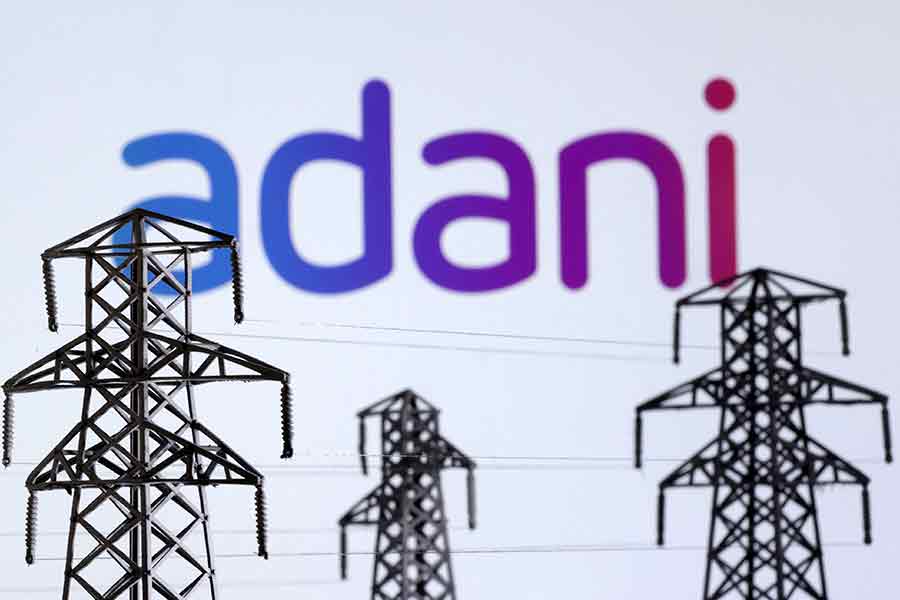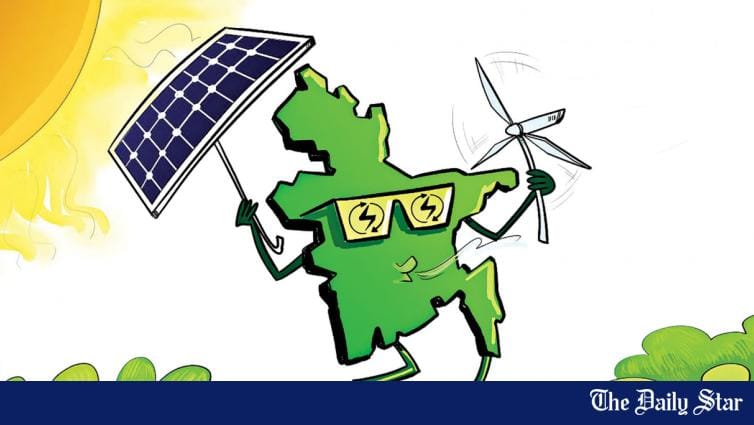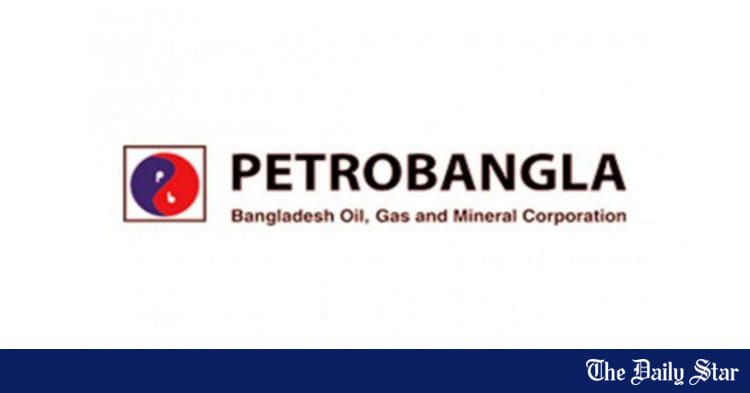Tackling renewable energy's critical dimensions
Muhammad Zamir
Published :
May 04, 2025 23:53
Updated :
May 04, 2025 23:53
Renewable energy, also called green energy, is made from renewable natural resources that are replenished on a human timescale. Some also consider nuclear power a renewable power source, although this is controversial, as nuclear energy requires mining uranium, a nonrenewable resource. Renewable energy installations can be large or small and are suited for both urban and rural areas.
Renewable energy systems have rapidly become more efficient and cheaper over the past 30 years. A large majority of worldwide newly installed electricity capacity is now renewable. Renewable energy sources, such as solar and wind power, have seen significant cost reductions over the past decade, making them more competitive with traditional fossil fuels. From 2011 to 2021, renewable energy has grown from 20 per cent to 28 per cent of global electricity supply. Power from the Sun and wind accounts for most of this increase, growing from a combined 2 per cent to 10 per cent. Use of fossil energy has also shrunk from 68 per cent to 62 per cent. In 2024, renewables accounted for over 30 per cent of global electricity generation and are projected to reach over 45 per cent by 2030. Many countries already have renewables contributing more than 20 per cent to their total energy supply, with some generating over half or even all their electricity from renewable sources.
Renewable energy is usually understood as energy harnessed from continuously occurring natural phenomena. The International Energy Agency defines it as "energy derived from natural processes that are replenished at a faster rate than they are consumed". Solar power, wind power, hydroelectricity, geothermal energy and biomass are widely agreed to be the main types of renewable energy. Renewable energy often displaces conventional fuels in three particular areas-- electricity generation, heating water and transportation. It is also useful for providing rural (off-grid) energy services.
Solar power produced around 1.3 terrawatt-hours (TWh) worldwide in 2022, representing 4.6 per cent of the world's electricity. Almost all of this growth has happened since 2010. Solar energy can be harnessed anywhere that receives sunlight; however, the amount of solar energy that can be harnessed for electricity generation is influenced by weather conditions, geographic location and time of day.
At this point one also needs to recognise that renewable energy has a critical role in addressing climate change. As part of the global effort to limit climate change, most countries have committed to net-zero greenhouse gas emissions. In practice, this means phasing out fossil fuels and replacing them with low-emissions energy sources. This much needed process, coined as "low-carbon substitutions" in contrast to other transition processes including energy additions, needs to be accelerated multiple times in order to successfully mitigate climate change. It may be recalled that at the 2023 United Nations Climate Change Conference, around three-quarters of the world's countries set a goal of tripling renewable energy capacity by 2030.
The European Union aims to generate 40 per cent of its electricity from renewables by the same year. The European Union has pledged Euro 1.3 billion, urging Bangladesh to increase renewable energy use by over 3 per cent and reform its energy structure. Recently, an event--"Renewable Energy Fest 2025" in Bangladesh focused on a green energy transition through policy reform, innovation and youth participation. Dr. Michal Krejza of the EU Delegation in Bangladesh, emphasised regional energy connectivity and said, "The EU has pledged Euro 1.3 billion to increase Bangladesh's renewable energy use by more than 3 per cent and reform its energy structure. This is being considered as vital if Bangladesh is to reach its electricity demand of 58,410 MW by 2041.
It would be pertinent to understand that renewable energy is more evenly distributed around the world than fossil fuels, which are concentrated in a limited number of countries. It also brings health benefits by reducing air pollution caused by the burning of fossil fuels.
Solar power produced around 1.3 terawatt-hours (TWh) worldwide in 2022, representing 4.6 per cent of the world's electricity. Almost all of this growth has happened since 2010. Solar energy can be harnessed anywhere that receives sunlight; however, the amount of solar energy that can be harnessed for electricity generation is influenced by weather conditions, geographic location and time of day.
Eco-scientists have observed that humans have harnessed wind energy for more than 2200 years. Until the 20th century, it was primarily used to power ships, windmills and water pumps. Today, the vast majority of wind power is used to generate electricity using wind turbines. Modern utility-scale wind turbines range from around 600 kW to 9 MW of rated power. The power available from the wind is a function of the cube of the wind speed, so as wind speed increases, power output increases up to the maximum output for the particular turbine. Areas where winds are stronger and more constant, such as offshore and high-altitude sites, are preferred locations for wind farms.
Wind-generated electricity met nearly 4 per cent of global electricity demand in 2015, with nearly 63 GW of new wind power capacity installed. Wind energy was the leading source of new capacity in Europe, the US and Canada, and the second largest in China. In Denmark, wind energy met more than 40 per cent of its electricity demand while Ireland, Portugal and Spain each met nearly 20 per cent.
Globally, the long-term technical potential of wind energy is believed to be five times total current global energy production, or 40 times current electricity demand, assuming all practical barriers needed were overcome. This would require wind turbines to be installed over large areas, particularly in areas of higher wind resources, such as offshore and likely also industrial use of new types of VAWT turbines in addition to the horizontal axis units currently in use. As offshore wind speeds average ~90 per cent greater than that of land, offshore resources can contribute substantially more energy than land-stationed turbines.
Investments in wind technologies reached US Dollar 161 billion in 2020, with onshore wind dominating at 80 per cent of total investments from 2013 to 2022. Offshore wind investments nearly doubled to US Dollar 41 billion between 2019 and 2020, primarily due to policy incentives in China and expansion in Europe.
It needs to be noted here that technological research is continuing at a serious and comprehensive manner with regard to the improvement of renewable energy technologies. There are also other renewable energy technologies that are still under development, including enhanced geothermal systems, concentrated solar power, cellulosic ethanol and marine energy.
The International Renewable Energy Agency (IRENA) has stated that ~86 per cent (187 GW) of renewable capacity added in 2022 had lower costs than electricity generated from fossil fuels. IRENA also stated that the capacity added since 2000 reduced electricity bills in 2022 by at least US Dollar 520 billion, and that in non-OECD countries, the lifetime savings of 2022 capacity additions will reduce costs by up to US Dollar 580 billion.
Solar power, also known as solar electricity, is the conversion of energy from sunlight into electricity, either directly using photovoltaics (PV) or indirectly using concentrated solar power. Solar panels use the photovoltaic effect to convert light into an electric current. Concentrated solar power systems use lenses or mirrors and solar tracking systems to focus a large area of sunlight to a hot spot, often to drive a steam turbine.
Photovoltaics (PV) were initially solely used as a source of electricity for small and medium-sized applications, from the calculator powered by a single solar cell to remote homes powered by an off-grid rooftop PV system. Commercial concentrated solar power plants were first developed in the 1980s. Since then, as the cost of solar panels has fallen, grid-connected solar PV systems' capacity and production has doubled about every three years. Three-quarters of new generation capacity is solar, with both millions of rooftop installations and gigawatt-scale photovoltaic power stations continuing to be built.
By 2024, solar power was generating 6.9 per cent (2,132 TWh) of global electricity and over 1 per cent of primary energy, adding twice as much new electricity as coal. Along with onshore wind power, utility-scale solar has become the source for new installations in most countries. As of 2023, 33 countries generated more than a tenth of their electricity from solar, with China making up more than half of solar growth. Almost half the solar power installed in 2022 was mounted on rooftops.
It would be worthwhile to point out here that solar-cell efficiencies of laboratory-scale devices using pertinent materials have increased from 3.8 per cent in 2009 to 25.7 per cent in 2021 in single-junction architectures, and, in silicon-based tandem cells, to 29.8 per cent, exceeding the maximum efficiency achieved in single-junction silicon solar cells. Perovskite solar cells have, therefore, been the fastest advancing solar technology as of 2016. With the potential of achieving even higher efficiencies and very low production costs, perovskite solar cells have become commercially attractive. Core problems and research subjects include their short and long-term stability.
Recently experts have suggested that Bangladesh urgently needs a long-term financing roadmap to promote renewable-energy projects and reach the country's target of net-zero carbon emission by 2050. They have also observed that to achieve the goal, the country that is extremely vulnerable to global warming, also requires the framing of the monetary policy in such a way that the commercial lenders-- both state-owned commercial Banks (SCBs) and private commercial Banks (PCBs)-- can feel encouraged to support proliferation of renewable energy.
In this context, it was good to know that the Islamic Development Bank (IsDB) has agreed to provide US Dollar 167 million in loans -- roughly Tk 20.10 billion -- to develop a 220MW solar power plant in the Sonagazi area of Feni district, a facility with the highest solar capacity in the country to date. The Power Division proposed the project with an estimated cost of Tk 21.35 billion, with the combined contribution of the government and Electricity Generation Company of Bangladesh Limited (EGCB) amounting to Tk 1.25 billion, according to Planning Commission sources. The project seeks to reduce dependence on fossil fuels, lower carbon emissions, and contribute to economic development and improved living standards.
Muhammad Zamir, a former Ambassador, is an analyst specialised in foreign affairs, right to information and good governance.




 www.newagebd.net
www.newagebd.net



















